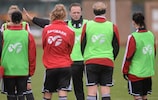Panico hoping for happy Italy ending
Saturday, June 29, 2013
Article summary
Patrizia Panico is limbering up for her fifth and almost certainly last UEFA Women's EURO and the Italy captain spoke to UEFA.com about the tournament and how it has evolved.
Article top media content

Article body
In 1997, a 22-year-old Patrizia Panico helped Italy to the UEFA European Women's Championship final, losing to Germany, and next month she will have her fifth and last attempt at going one better.
Striker Panico, at 38 the captain with an Italian record 179 caps and 97 goals, will lead the Azzurre at UEFA Women's EURO 2013, 17 years on from her debut in a qualifier against Portugal – naturally, she scored. Since that 1997 showpiece, Italy have fallen twice at the group stage before running Germany close in the quarter-finals four years ago. Panico tells UEFA.com how she will use her experience in Sweden, how things have changed since her first tournament, and who the next leader of Italian women's football will be after what "for me will be the last EURO".
UEFA.com: What does it mean to you to play in this competition?
Patrizia Panico: I'm sure that for me it will be the last EURO, but I don't think there is extra pressure. My objective should be the objective of the team; that is the right way.
UEFA.com: What is the best thing about your team, what gives you most confidence?
Panico: In a competition like this it's important to have experience – not experience in age, but experience of having played a lot of other tournaments like I have, like the EURO, because the rhythm at events like this, and the tension you have, can be terrifying for someone who hasn't experienced it before. So if you are a bit more experienced you are then also a bit more prepared. And as a consequence you can help the younger players in the team, you can help them stay calm, be more relaxed and so more prepared.
UEFA.com: Can you describe how it felt to wear the Italy shirt for the first time?
Panico: I remember that fantastic moment – especially when I was listening to the Italian anthem, I really had goosebumps. It's an indescribable feeling. But the nice thing is that that emotion back then, I still feel it now. I have played many international matches but when you're wearing those colours it's an emotion that is difficult to lose.
UEFA.com: This will be your fifth Women's EURO. How have the demands of the tournament changed since your first?
Panico: I think the EURO has improved from year on year, so every tournament has added something to the previous one. It's not been small steps but great improvements, because Europe, in general, has believed a lot in women's football. There are business opportunities, there is huge growth, a lot has been invested – and a lot earned.
UEFA.com: Who would you say is the best player you have seen or faced at a Women's EURO?
Panico: I have always been impressed by [ex-Germany forward Birgit] Prinz, because she was not only a symbol of power – physically very strong and a match winner – she was also a very modest person. She always played for the team and chased back to recover possession. She was always the driving force and never caused problems. She is just an example of modesty and respect towards opponents.
UEFA.com: Which player in the Italy side do you think can make an impact?
Panico: Midfielder Alice Parisi – I like her strengths, which are similar to what I just said about Prinz. She is very modest and very strong physically, but her main quality is her modesty. And with attributes like that you can do well in any competition, on a European or world stage. I think she will not only be good at this EURO, she'll do well at many more EUROs because she is still a young player.
UEFA.com: In your group you play Finland, Denmark and Sweden. What challenges do you expect from them?
Panico: It is actually a pretty special group, because while all three teams are north European, they all play a different style of football. Sweden are certainly the strongest of the three, not least because they are hosts. Sweden have top players who can decide a match by themselves, players like [Lotta] Schelin. And they play football which is not typically northern European. They keep the ball on the ground, pass the ball quickly. And they combine that with their physical strength, which is very important, especially in defence.
Then there's Finland and Denmark. Denmark are a team that find themselves in a state of evolution, meaning they are a developing team – they've had a big change in generation. They have suffered a bit lately. But Denmark are a team who have always been among the finalists, finishing first or second at tournaments like this, so they tend to go a long way.
Finland did very well at the previous tournament when they were hosts. They only just missed out on making it further in the tournament. They were physically a very strong team and they'll certainly want to repeat those performances from the last EURO.










